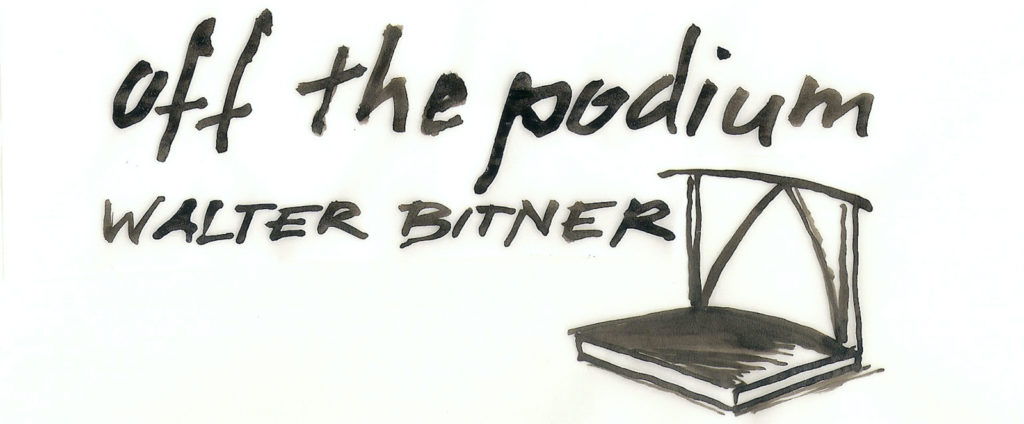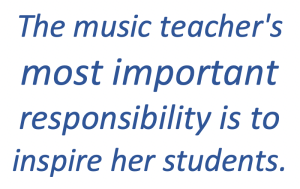
Continued from Inspiration, Part 1
Breathing Life Into Your Work
The heart of the matter is that you can’t inspire your students if you aren’t inspired yourself. It is your responsibility, if you teach music, to find ways to remain inspired by what you do – to continue your own engagement in making music for its own sake. This can be a tall order in the face of all the demands made upon teachers today – but it’s crucial. It’s crucial for you to remain true to the ideals and inspiration that brought you into this work in the first place, if you are to give your students the experience they came to you for, and if you are to navigate the difficulties teachers face today – not to mention the difficulties of adult life we all face – and stick with teaching for the long haul.
Therefore, here are two important strategies for maintaining your own inspiration:
Make a commitment to continue to make music outside of your work in the classroom. This can take an almost infinite variety of forms. Here are a few suggestions: try one!
- Participate in a community choir, band, or orchestra.
- Sing in your church choir; accompany, direct, or play in the praise band, handbell choir, etc.
- Audition for roles in community musical theater productions (and play those roles!).
- Continue to study your primary instrument, and schedule recitals, gigs, or other performance opportunities.
- Take lessons and learn a new instrument!
- “Moonlight” in a (rock, jazz, blues, funk, punk, country, hiphop, salsa, contradance, etc.) band – rehearse with your friends and play gigs.
If you’re a musician, you can do it! Doing one of these to stay inspired should not be impossible – I have done nearly all of the above at one stage or another of my life.
Be careful of substituting professional association activities for this strategy – involvement in the competitive activities organized by your music education association may be of benefit to your career and to your students, but it is unlikely to provide the vital personal musical activity you need to maintain your own inspiration. You are human and your time is limited.
Attending concerts and performances is not a substitute for engaging in musical activity directly – as inspiring as these experiences can be. By all means engage in musical events as a member of the audience on a regular basis. But this is not a substitute for making music yourself.
As you grow older and accumulate responsibilities, and perhaps a spouse, children, a mortgage, debt…. you may find it difficult to maintain social commitments for pursuing personal musical activities. I know I have. This is natural. It’s not impossible, but it’s a challenge as you get older to keep the thread of this kind of musical activity going on a regular basis without the pressure of social commitments.
Choose repertoire that inspires you:
In the fall of 2012, I found myself directing a high school choir with a student accompanist (Graham Goudeau) all capable of taking on a major work, and programmed Johannes Brahms’ exquisite Lieberslieder Walzer, Op. 52, which I have adored since I first sang them in the bass section of the Scripps College Chamber Choir in Claremont, California in 1985. I knew that the opportunity to bring this particular work to students would not come my way again, and made the extra effort to learn the primo piano part so I could play the four-hands accompaniment with Graham alongside preparing the choir to sing the entire set of eighteen waltzes in German. I cannot express how much joy every rehearsal and performance of this beloved masterpiece gave me, and I know that those who were part of it will never forget it.
Years later a student who had been in the choir texted me from Berlin to tell me that although she could not speak German, on her visit there she could not get the Liebeslieder out of her head.
Choose repertoire for your students that inspires you. If you are a music teacher, the majority of your time making music will be spent making music with your students. It is vital that the music you bring to them – the music you rehearse and perform with them – is music that is meaningful to you.
I cannot stress this enough. If you rely on others to choose the music you bring your students for you – if you let textbooks, music education associations, publishers, administrators, parents, or the students themselves choose this material – you severely risk losing the inspiration that brought you to this profession in the first place. It is imperative that you choose music that is resilient and that you love. If you don’t love it, you are not going to be able to sell it to your students if it is music they don’t know and love already – and your job is to teach them what they don’t know. The long rehearsal process required for you to prepare your students to perform will extinguish any pleasure you have in performing uninspiring music before you reach the end of the process.
Don’t do it.
Choosing repertoire that will provide inspiration for both you and your students takes much more time than just consuming curriculum products that have been ready-made for the classroom. Yes, it takes more work! Don’t skimp on this vital preparation – it will make all the difference between being an inspiring teacher and being one who is merely effective.
The other important factor that makes this strategy so important is that it is likely that your job as a teacher will be very time-consuming. As you grow older and no longer have the seemingly bottomless reserves of energy that you had in your twenties and thirties, you may find it more difficult to maintain music-making commitments outside of your work with students. It is therefore crucial that the music you make with them inspires you as well as them – at times this may be the only music you get to make.
Music Is An Art
 Despite the scientific methodologies that have been brought to bear on teaching and on teaching music, the practice of making music and the activity of imparting this practice to our students remain an art. Yes, many aspects of making music can be approached in a scientific manner, technology has been incorporated into how musicians make music since ancient times (a violin is one of the most sophisticated examples of technology ever developed), and science and technology can benefit our work in many ways.
Despite the scientific methodologies that have been brought to bear on teaching and on teaching music, the practice of making music and the activity of imparting this practice to our students remain an art. Yes, many aspects of making music can be approached in a scientific manner, technology has been incorporated into how musicians make music since ancient times (a violin is one of the most sophisticated examples of technology ever developed), and science and technology can benefit our work in many ways.
But fundamentally, the work you do in class, the handing down what you received from your teachers to your students in turn, the passing on and sharing of this vital breath of inspiration – this cannot be measured nor found in the balance sheet approach to evaluation our society has foisted on us.
Find the best ways you can to continually deepen your own practice as a musician and remain inspired, so that you can continue to pass this on to those in your care.
©2019 Walter Bitner
Walter Bitner is a multi-instrumentalist, singer, conductor, and teacher, and serves as Director of Education & Community Engagement for the Richmond Symphony in Richmond, Virginia. His column Off The Podium is featured in Choral Director magazine, and he writes about music and education on his website Off The Podium at walterbitner.com.


Leave a Reply
You must be logged in to post a comment.